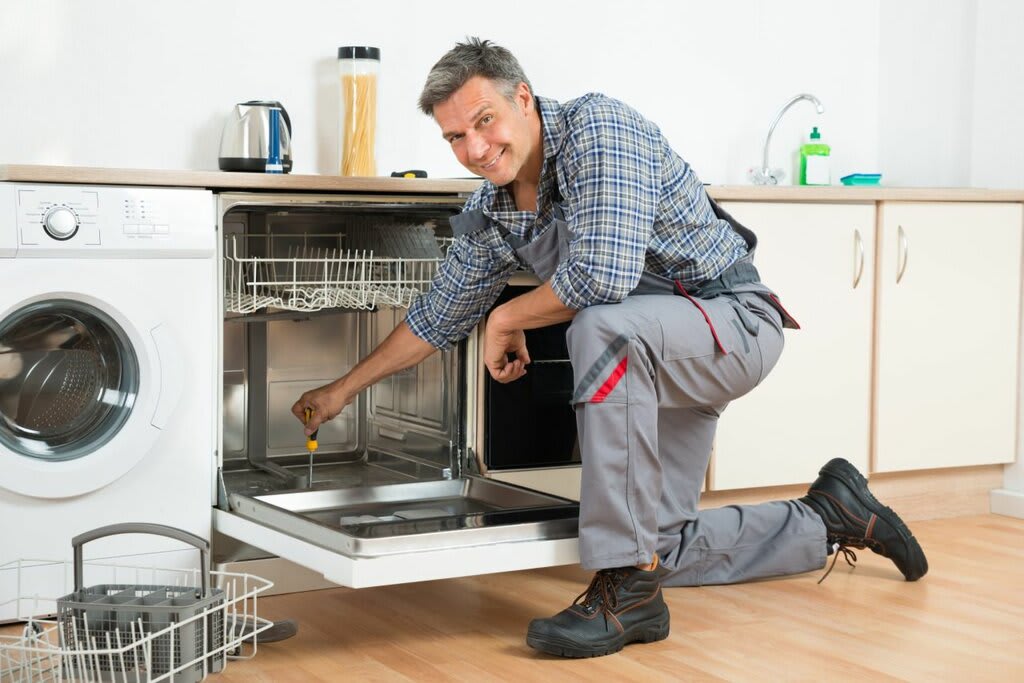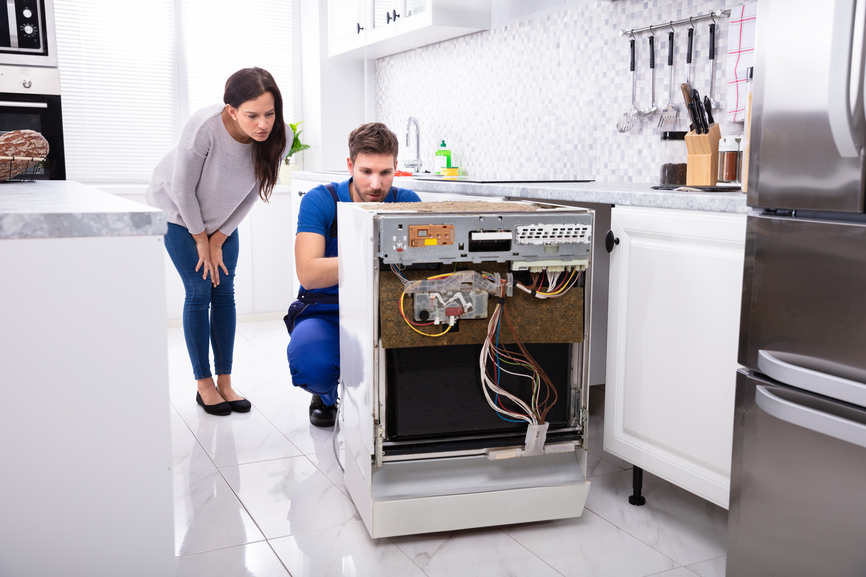Get Rid of Moldy Washer Smell – Maytag Washing machine repair Dependable Refrigeration & Appliance Repair Service
Get Rid of Moldy Washer Smell – Maytag Washing machine repair Dependable Refrigeration & Appliance Repair Service
Blog Article
The Ultimate Guide to Recognizing Device Repair Work in the house
When your refrigerator quits cooling or your oven refuses to warmth, it can really feel overwhelming. Recognizing device repair at home can conserve you time and cash. You'll find out to identify signs, use vital devices, and follow a methodical troubleshooting procedure. Before you start, there are important safety and security precautions you need to take into account. What are one of the most usual issues, and exactly how can you fix them? Let's check out the fundamentals.
Common Appliance Troubles and Their Symptoms
When your home appliances start breaking down, it's necessary to acknowledge the indications early. Overlooking them can cause larger problems and expensive fixings. For example, if your fridge isn't cooling down properly, you might observe cozy spots or condensation creating. This could suggest a stopping working compressor or an obstructed vent.Your dishwashing machine may reveal troubles with dirty dishes or unusual sounds throughout cycles. If you listen to grinding or clanking, it's time to investigate.A washing machine that won't spin or drain pipes can leave you with soaked washing, suggesting a clogged drain or a malfunctioning pump.Lastly, if your oven's temperature appears off or it takes for life to pre-heat, you may be taking care of a malfunctioning thermostat. By staying alert to these signs and symptoms, you can resolve concerns before they intensify right into significant repairs.
Important Tools for Home Appliance Fixing
When you're tackling appliance repair work in your home, having the right devices is necessary. Basic hand devices like screwdrivers and pliers will certainly help you dismantle and repair different home appliances, while electric screening devices ensure you're functioning safely with wiring. Let's review what you need to start on your repair work trip.
Basic Hand Tools
Having the right devices is necessary for reliable appliance repair in the house. Start with a trustworthy screwdriver set, consisting of both flathead and Phillips kinds, as screws are common in home appliance assembly. Pliers are likewise crucial; they aid with gripping, twisting, and reducing cables or tiny components. A pair of needle-nose pliers can get to tight areas easily. You'll need a good adjustable wrench for tightening or loosening up nuts and bolts. An utility knife comes in handy for cutting with product packaging or insulation. Don't fail to remember a tough workbench or surface to securely organize your tools and components. With these basic hand tools, you'll be well-prepared to deal with most appliance repairs that come your method.
Electric Screening Gadgets
Alongside basic hand devices, electric screening tools play an essential duty in home appliance fixing. These tools help you diagnose electrical problems and warranty devices function securely. A multimeter is vital; it determines voltage, present, and resistance, permitting you to identify troubles rapidly. A non-contact voltage tester is another essential, allowing you find real-time cables without making straight call, boosting your safety and security. Secure meters are terrific for determining present flow in wires without disconnecting them, conserving you effort and time. In addition, circuit testers can rapidly inspect if outlets are working properly. By making use of these tools, you'll simplify your troubleshooting process and enhance your repair skills, making device upkeep a whole lot easier.
Step-by-Step Overview to Diagnosing Home Appliance Issues
When your appliance breaks down, it can be frustrating, yet diagnosing the problem doesn't have to be overwhelming. You'll find out to recognize typical problems and use efficient troubleshooting methods. Allow's go through the actions to get your device back in functioning order.
Usual Device Troubles

Fixing Techniques Clarified

Fixing Major Kitchen Area Home Appliances: A Closer Look
Have you ever before questioned how to take on usual issues with your cooking area home appliances? Fixing significant kitchen area appliances like refrigerators, stoves, and dishwashing machines can be simpler than you think. Begin by identifying the issue-- whether it's a fridge not cooling down or a stove that will not heat. Often, an easy reset or checking the power resource can solve the issue.For fridges, tidy the condenser coils and examine the door seals. If your oven's not home heating, inspect the heating component and thermostat. Dish washers might just require a tidy filter or a reset to get them back in activity. Constantly unplug the home appliance before diving into repair work to ensure your safety.Don' t forget to consult the individual manual for specific troubleshooting tips connected to your design. With a little bit of persistence and the right tools, you can confidently take on home appliance fixings check it out and conserve cash in the process!

Repairing Washing Equipments: Tips and Techniques
When your washing home appliances begin acting up, it can really feel overwhelming, yet troubleshooting them doesn't need to be a problem. Start by checking the power supply. Validate the device is connected in and the electrical outlet is operating. Next, check the door or cover switch; a defective button can protect against the machine from operating.For washers, if it's not spinning, look for unbalanced tons. Rearranging the garments may solve the issue. If your dryer isn't home heating, clean the lint filter and check the vent for blockages.Listen for unusual noises; they can indicate a trouble. If your device is leaking, check the hoses for splits or loosened connections. Paper any kind of mistake codes displayed on electronic screens, as they can guide you in recognizing the issue. Ultimately, seek advice from the customer guidebook for specific fixing ideas associated with your version.
Safety Precautions to Take During Repairs
Before you start any kind of appliance repairs, it's important to focus on safety to stop crashes or injuries. Disconnect the device or transform off the circuit breaker to ensure no power reaches it while you work. Usage shielded devices to decrease the danger of electric shock. Wear safety and security goggles and gloves to secure yourself from sharp sides or debris (Dependable Refrigeration & Appliance Repair Service Washing Machine Repair).Make certain your work space is tidy and well-lit, so you can see what you're doing. Keep children and family pets away from the area to avoid diversions and potential dangers. If you're dealing with gas devices, be extra cautious; check for leakages before proceeding.Take your time, and do not hurry via repair work. If you really feel uncertain about any kind of action, it's better to pause and research than to presume. Complying with these preventative measures will certainly aid create a much safer setting for your DIY appliance repair work task
When to Call a Specialist for Aid
Exactly how do you understand if it's time to contact a specialist for device repair work? If you've tried fundamental troubleshooting without success, it's a clear sign. If your appliance still won't start or reveals uncommon sounds after resetting it, do not wait to look for professional help.When you discover leakages, smoke, or melting scents, focus on safety and call a pro quickly. These issues can cause more considerable damage or pose threats to your home.Also, if your appliance is under warranty, contacting a specialist is often the most effective path. They can guarantee that repair work won't void your warranty, conserving dishwasher repair service you money in the long run.Finally, if you're uncertain or uneasy with intricate fixings, it's important to leave it to the professionals. Remember, taking on difficult concerns without the right know-how can bring about costly errors. Trust an expert when unsure!
Regularly Asked Inquiries
Exactly How Can I Stop Device Troubles in the Future?
To prevent device problems in the future, you ought to do regular upkeep, look for wear and tear, clean filters, and stay clear of overloading. Remaining positive will help expand their lifespan and keep them running smoothly.
What Are one of the most Common DIY Device Repair Mistakes?
You could ignore safety precautions, avoid fixing actions, or utilize wrong tools when trying DIY appliance repair work. Hurrying the process or overlooking producer guidelines can bring about even more significant issues and pricey blunders. Remain person and notified!
How Do I Know if a Component Demands Replacement?
You can tell if a component needs substitute by looking for uncommon sounds, leakages, or inconsistent performance. If the device has a hard time to operate correctly or shows noticeable damages, it's likely time for a replacement.
Can I Make Use Of Generic Components for Home Appliance Fixes?
Yes, you can utilize common components for device repair work, but identify they work - Dryer repair Oro Valley Dependable Refrigeration & Appliance Repair Service. Generic parts could save you cash, but they can affect efficiency or longevity, fix washing machine near me so consider your alternatives meticulously prior to choosing
What Guarantees Cover Device Fixes?
Most appliance warranties cover repair services for producing problems, yet they often omit damage from misuse. Inspect your service warranty terms very carefully, as some may require utilizing licensed professionals and original parts for insurance coverage to remain legitimate.
Report this page